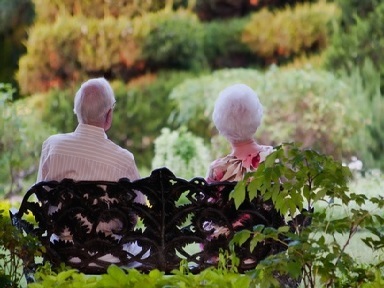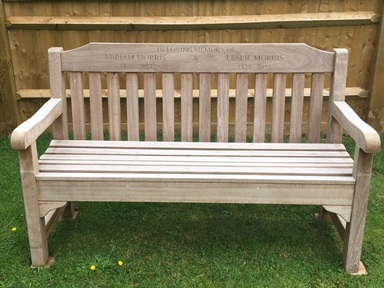Care home creates touching memorial garden to ensure residents are 'never forgotten'
Reminiscence is the recall of memories and events from the past and can be part of a person-centred approach to caring that improves the well-being of older people and those living with dementia.

Reminiscence therapies are used frequently in people's lives as well as in residential care settings and can be used to cope in times of stress, creating a feeling of intimacy and giving special meaning to sharing time with others.
The Donnington Care Home in Newbury, part of the Bupa care group, welcomed the idea of a ‘memory garden’ to help residents, staff and relatives reminisce about those who had passed away. Features including a memorial garden, reminiscence bench and a memory wall have been specifically designed around the resident’s past interests enabling them to reconnect with their memories.
Sense of connection
Claire Cullen, registered manager of The Donnington Care Home, developed the idea of the memorial garden to provide residents with a vast sensory area to enjoy, as well as a place to quietly reflect upon past memories and to remember friends.
Commenting on her own personal experience, she said: “My grandma was here at the home for four years and when she passed away in February 2014 I wanted somewhere to sit and have time to remember her at the home.
“The memory garden ensures that families and staff know that loved ones will always be remembered and also provides a safe environment to sit and recall happy times with their loved ones.
“One of our very long standing care assistants talks to the families of our residents who have passed away and invites them to provide us with a rose to plant in their memory. The rose shows that no-one is ever forgotten, and is a point of conversation for staff to remember with fondness the people they have cared for.”
Poems pay tribute 
Much to the delight of the residents, the surrounding landscaped garden is stocked with an abundance of plants and flowers to stimulate senses, whilst a poignant memorial bench, donated by the family of past residents, sits within a tranquil area, enabling residents and staff the opportunity to pay tribute to the memory of someone special.
Inside the care home, a themed ‘memory wall’ devoted to residents who have died, often stokes conversations amongst residents, staff and family members. Thoughtfully written poems are placed on the memory wall and often encourage residents to talk about what life was like 60 or 70 years ago.
Exchanging memories
Reminiscence involves exchanging memories with the old and young, friends and relatives, with caregivers and professionals, passing on information, wisdom and skills. It is about giving the resident a sense of value, importance, belonging, power and peace.
Linda Patel, well-being and activity manager at Bupa UK, said: “Memory gardens and memory walls provide a place and opportunity for residents, families and even staff to remember those who have passed away. They help give a sense of connection for those who are grieving with those they have lost, and of course, an area where they can reminisce in peace and quiet.
“Even for those not grieving, these areas provide a change of scenery from the indoors, particularly for residents who have difficulty getting out and about. Where possible, we encourage our homes to build these – as they can often help residents to remember a garden they may have had or tended to when they were younger, and the sights and sounds can help stimulate residents’ senses, particularly those that are living with dementia.”
 Reminiscence empowers people
Reminiscence empowers people
Ms Cullen said: “On a daily occurrence, staff can be seen having a break on the bench by the garden, which can also be used by families of residents who remain in the home. Our reminiscence board is also used for copies of the order of service from funerals, and for people to write poems, which are often about their thoughts of a loved one who has passed. It is always admired by residents, families and staff and brings back happy memories of residents who we have all known.”
Dr. Jason Karlawish, co-director of the Penn Memory Center at the University of Pennsylvania School of Medicine, believes ‘memory features like these create spaces that kindle pleasant memories and should become more of the norm’ in care settings.
Health and well-being
Reminiscing and life history work can be an effective way of communicating with older people and for those living with dementia. It can be the basis for enjoyable time spent together and a way for people to feel empowered, contributing positively to their well-being.
While there remains no cure for people living with dementia, care providers looking after the increasing number of adults with conditions like Alzheimer’s are faced with the challenge of prolonging an individual’s health and well-being for as long as possible. By stimulating cognitive ability through reminiscence, experts agree that the effects of memory loss can be delayed.
According to new research, tending or simply being in gardens can also have a marked effect on older people, particularly for those living with dementia as it can reduce agitation and aggression as well as help with concentration and connection with past memories.

Other benefits are less obvious. For example, spending time outdoors can improve residents’ sleeping and eating patterns, reduce dependency on others and can help them cope more effectively with some of the symptoms of health issues, such as anxiety and depression.
'Gardens are intimately connected to health'
Reminiscent, sensory gardens can prove an invaluable accompaniment to care homes focused upon making the most of personal life experiences. Everybody has a life story, which are rich and varied and can be used to communicate who we are to the people around us.
As ‘gardens are intimately connected to our health and well-being,’ experts believe they should be integrated into all mainstream health policy.
click here for more details or to contact The Donnington Care Home
Latest Features News
 25-Nov-19
2019 Election: Boris Johnson leaves social care in 'too difficult box' but Labour vows to end 'crisis'
25-Nov-19
2019 Election: Boris Johnson leaves social care in 'too difficult box' but Labour vows to end 'crisis'
 18-Oct-19
Podcast: Wendy Mitchell and dementia: 'My biggest fear is not knowing who my daughters are'
18-Oct-19
Podcast: Wendy Mitchell and dementia: 'My biggest fear is not knowing who my daughters are'
 27-Sep-19
Exclusive: Care minister backs care workers' call for time off to grieve and attend funerals
27-Sep-19
Exclusive: Care minister backs care workers' call for time off to grieve and attend funerals
 19-Sep-19
Podcast: Gyles Brandreth says poetry helps ward off dementia
19-Sep-19
Podcast: Gyles Brandreth says poetry helps ward off dementia
 30-Aug-19
Edinburgh Fringe funnyman joins comics facing toughest audience at care home gig
30-Aug-19
Edinburgh Fringe funnyman joins comics facing toughest audience at care home gig